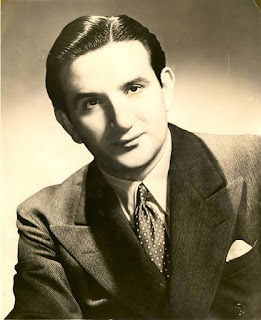Raymond Scott
Raymond Scott (September 10, 1908 – February 8, 1994) was an American composer, band leader, pianist, record producer, and inventor of electronic instruments.
Though Scott never scored cartoon soundtracks, his music is familiar to millions because Carl Stalling adapted it in over 120 Bugs Bunny, Porky Pig, Daffy Duck, and other Warner Bros. Looney Tunes and Merrie Melodies cartoons.
In late 1936, Scott assembled a band from among his CBS colleagues, calling it the Raymond Scott Quintette. It was a six-piece group, but he thought "Quintette" (his spelling) sounded "crisper"; he also told a reporter that he feared "calling it a 'sextet' might get your mind off music." His sidemen were Pete Pumiglio (clarinet); Bunny Berigan (trumpet, replaced by Dave Wade); Louis Shoobe (double bass); Dave Harris (tenor saxophone); and Johnny Williams (drums). They made their first recordings in New York on February 20, 1937, for Master Records, owned by music publisher/impresario Irving Mills (Duke Ellington's manager).
The Quintette represented Scott's attempt to revitalize swing music through tight, busy arrangements that reduced reliance on improvisation. He called this style "descriptive jazz" and gave his works unusual titles like "New Year's Eve in a Haunted House", "Dinner Music for a Pack of Hungry Cannibals" (recorded by the Kronos Quartet in 1993), and "Bumpy Weather Over Newark". Although his songs were popular with the public, jazz critics disdained them as novelty music. Besides being a prominent figure in recording studios and on radio and concert stages, Scott wrote and was interviewed in DownBeat, Metronome, and Billboard.
Scott believed in composing and playing by ear. He composed not on paper but "on his band"—by humming phrases to his sidemen or by demonstrating riffs and rhythms on the keyboard and instructing players to interpret his cues. It was all done by ear with no written scores, a process known as head arrangements). Scott, who was also a savvy sound engineer, recorded the band's rehearsals on discs and used the recordings as references to develop his compositions. He reworked, re-sequenced, and deleted passages, and added themes from other discs to construct finished works. During the developmental process, he let his players improvise, but once complete, he regarded a piece as relatively fixed and permitted little further improvisation. Scott controlled the band's repertoire and style, but he rarely took piano solos, preferring to direct the band from the keyboard and leave solos and leads to his sidemen. He also had a penchant for adapting classical motifs in his compositions.
The Quintette existed from 1937 to 1939 and recorded bestselling discs such as "Twilight in Turkey", "Minuet in Jazz", "War Dance for Wooden Indians", "Reckless Night on Board an Ocean Liner", "Powerhouse", and "The Penguin." One of Scott's popular compositions is "The Toy Trumpet", a cheerful pop confection that is instantly recognizable to many people who cannot name the title or composer.
Read more on Wikipedia
Listen to Raymond Scott on Swing City Radio. We are a Big Band Radio Station playing a wide selection of Big Band and Swing music.
Swing City Radio plays Raymond Scott - Listen to our station and hear the songs:
Pretty Little Petticoat
Huckleberry Duck
Boy Scout In Switzerland
Siberian Sleighride
Manhattan Minuet
Dead End Blues
Sleepwalker
Tobacco Auctioneer
The Penguin
Dinner Music For A Pack Of Hungry Cannibals
Powerhouse







